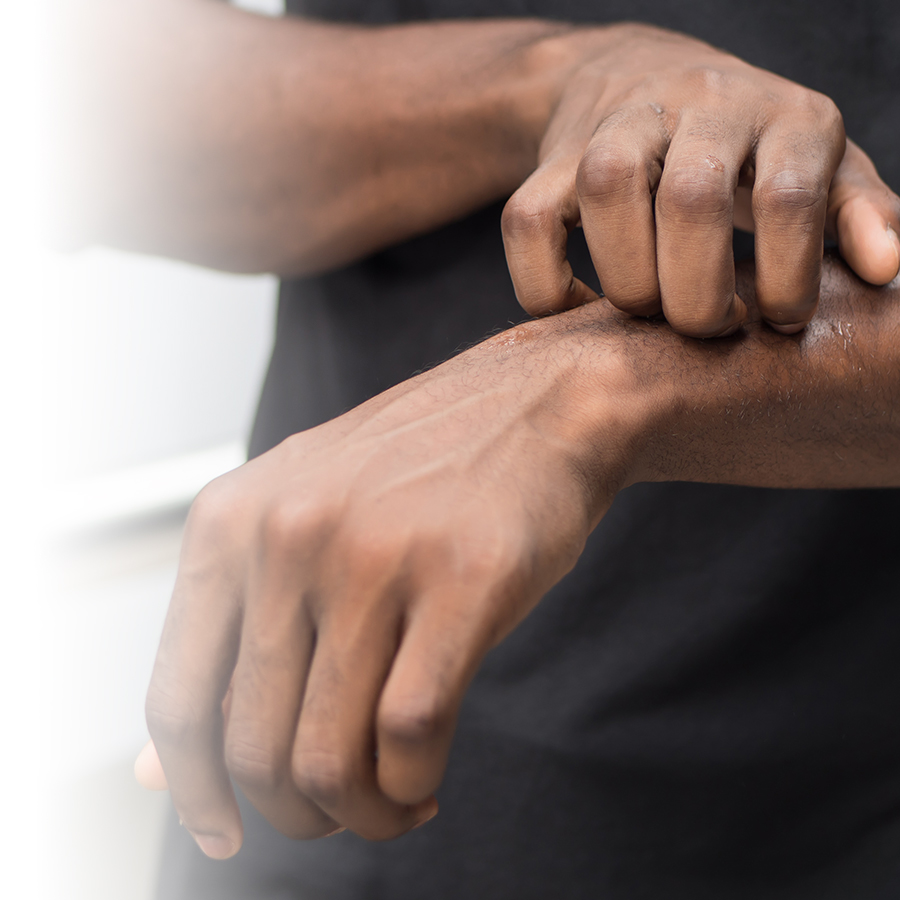Who hasn’t already experienced itchy skin? The infamous "…but it’s itchy!" is a well-known expression in every family. Learn more about itchy skin.
Why does skin become itchy?
Itchy skin or “pruritus” is a common problem. Pruritus is clinically defined as a subjective and unpleasant sensation that provokes the desire to scratch. It is not a disease, but rather a symptom that is felt when the skin sends the nervous system a message, telling you that there is an underlying problem.
The itching sensation is in fact the result of substances released by the skin that activate specific receptors, and these messages send the information to the brain through the spinal cord. In very simple terms, the brain receives the following message, "The skin is itchy—there must be something wrong."
What are the possible causes of itchy skin?
Itchy skin can result from a multitude of causes and triggers. Here are some examples.
Dry skin
Itching is often a sign of dry skin. In general, the drier the skin is, the more it tends to itch. Dry skin can occur at any time during the year, but most often in winter. You can prevent it by moisturizing your skin, which helps to keep it soft and healthy.
We suggest that you read the following text for additional information:
Skin diseases
Itching is a typical symptom of certain skin conditions, including prevalent inflammatory diseases such as eczema, urticaria, and psoriasis. Additionally, some infections such as fungal infections, scabies, and shingles can also be the cause.
We suggest that you read the following texts for additional information:
- How to recognize eczema
- Nine ways to prevent and treat eczema
- Hand eczema
- Overview on psoriasis
- Shingles: when the varicella virus returns
Insect bites
For thousands of years, humans have cohabited with insects in relative harmony. However, attacks from either side can occur on occasion. Insect bites from certain insects such as mosquitoes or bedbugs can be unpleasant, including itching.
We suggest that you read the following texts for additional information:
Contact with irritating, allergenic or toxic substances.
An inflammatory response by the skin following contact with a substance is called contact dermatitis. This response can be caused by an allergy to the substance or due to particularities unique to that person or to that substance. For instance, chemical or cleaning products, certain materials, and poison-ivy can cause contact dermatitis.
We suggest that you read the following texts for additional information:
Allergies
Individuals who suffer from some form of allergy (to food, animals, pollen, chemical products, etc.) are likely to experience itchy skin, since it is a typical allergy symptom in general. In these cases, the use of an oral or topical (to be applied to the skin) antihistamine, can be beneficial.
We suggest that you read the following texts for additional information:
What is the best advice to follow when you have itchy skin?
Avoid scratching.
If your skin itches, it is normal to have the reflex to scratch. This certainly provides momentary relief, but it can also have unfortunate consequences such as irritating the skin, worsening pruritus, and increasing the risk of infection. Instead, gently massage the area of the skin that itches with the palm of your hand, while applying some pressure.
Consult a healthcare professional
It is easier to find solutions to the itching when its cause is known. If the professional consulted is able to make a diagnosis or to determine the trigger, they can suggest some options to effectively prevent, treat or relieve itching. There is no single treatment against itching, but rather dozens! Each situation is unique just as is its management.
There are a number of products and medications available at the pharmacy designed to relieve itching. Pharmacists can help you to make a clear choice and suggest measures to remedy the unpleasant situation. Don't hesitate to consult your pharmacist!


